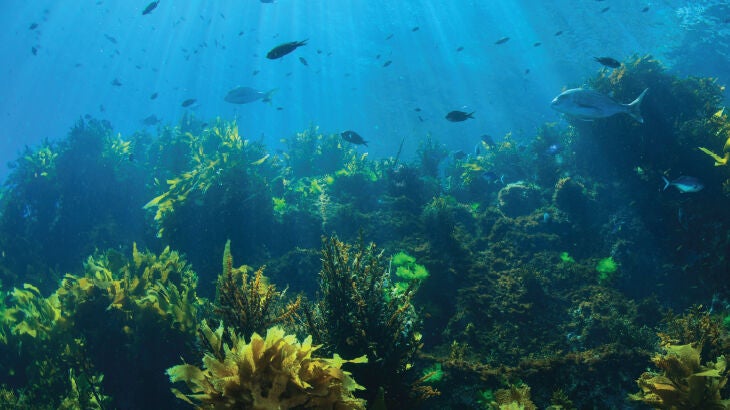Waterfront -
Healthy ocean, healthy future

Three years ago, Bayleys formed a partnership with one of New Zealand’s youngest charitable organisations, Live Ocean Foundation, drawn to their vision, ambition and ability to drive action.
The ocean is at a tipping point that can no longer be ignored and this underpins everything that Live Ocean Foundation, the marine conservation charity founded by world champion New Zealand sailors Peter Burling and Blair Tuke, stands for.
Covering 70 percent of the earth’s surface, and an important carbon sink that absorbs carbon dioxide from the atmosphere, the ocean has helped keep our planet at habitable temperatures in the face of rising carbon emissions and resulting global warming, says Live Ocean.
But with scientists warning of a rapidly changing ocean – with evidence of rising sea levels, more marine heatwaves and ocean acidification – New Zealand needs to act to protect and conserve its ocean space.
“As guardians to one of the largest and most significant ocean spaces on the planet, it’s indisputable that Aotearoa New Zealand has an important role to play globally,” says Live Ocean Foundation chief executive Sally Paterson.
“Right now, we’re not doing nearly enough, with less than one percent of our ocean space protected.”
Paterson says it’s this reality that Live Ocean Foundation is working to address, bringing people together around the issues facing the ocean, using the platform of sport to reach new audiences, and partnering with exceptional New Zealand marine scientists, innovators and communicators to scale up action for a healthy ocean.
“In 2023, Live Ocean joined forces with another ocean athlete to get Kiwis thinking and talking about the dire underwater state of the treasured Tīkapa Moana, Hauraki Gulf Marine Park, in a way that hadn’t been done before.
“Swim4TheGulf catapulted 33-year-old open-water swimmer Jono Ridler into the New Zealand record books and the hearts and minds of Kiwis, as he swum non-stop, with no wetsuit, for more than 33 hours from Aotea Great Barrier to Campbells Bay on Auckland’s North Shore.”
Live Ocean co-founder Peter Burling said Jono showed huge courage, taking on something most of us find hard to even get our heads around.
“Now it’s time for the government to show a level of ambition that matches Jono’s effort and prioritise protection and restoration of the Hauraki Gulf to ensure it thrives into the future.”
Jono noted the lack of marine life and the barren underwater seascape in the Gulf and Live Ocean says subsequently, progress has been made with government announcements in August to expand the Gulf’s marine protected areas, and an intention to greatly reduce trawling in the marine park.
It’s the same stretch of water where one of the marine scientists backed by Live Ocean is conducting globally significant research.
Dr Caitlin Blain, a research fellow at the University of Auckland’s Institute of Marine Science, has spent more than seven years researching seaweed and kelp forests with her current focus centred around the role of kelp forests in coastal carbon cycles and climate change mitigation.
“Kelp forests are the ‘trees of the sea’ and hugely important as both home and food for marine life, but also really efficient at fixing carbon,” explains Paterson, acknowledging Blain’s valuable work.
“However, a range of human impacts are detrimentally affecting the kelp forests around New Zealand’s coastlines.
“In the Hauraki Gulf, scientists say the loss of large snapper and crayfish through over-fishing means kina are now grazing down the kelp beds at an alarming pace, without their natural predators to keep them in check.”
However, kelp beds can be restored and those flourishing within the Goat Island marine reserve north of Auckland are a shining example.
In the South Island, kelp forests face different challenges again, like the 2017-2018 summer marine heatwave which caused sea surface temperatures to climb to record levels wiping out much of the native kelp around Christchurch and Lyttelton Harbour.
A collaborative project is now underway seeking to restore native rimurimu kelp in the harbour to bring back a flourishing ecosystem.
The ocean represents the largest global reservoir of organic carbon, with carbon stocks far surpassing that of terrestrial systems so as a result, the search for natural climate solutions is shifting to the marine space.
Globally, kelps and other large seaweeds are touted as ‘climate champions’ with their enormous CO2 mitigation potential.
But Live Ocean highlights that despite the perceived value of kelp forests as carbon sinks, they’ve not yet been credibly included in carbon crediting schemes due to knowledge gaps around the release and storage of organic carbon.
“Scientists like Dr Blain are working hard to better understand what’s actually happening below the surface and around our coastlines and valuing kelp in the ‘blue carbon’ context will help inform better marine management and conservation decisions here in New Zealand,” says Paterson.
The objectives of Blain’s kelp research are threefold – quantifying the production, release, and chemical composition of organic carbon from kelp, assessing the longevity and effect of this carbon, then looking at the potential for mitigating climate change if we can successfully bring back thriving coastal kelp forests.
The recently released Live Ocean Barometer '23 showcasing independent research on how New Zealanders value and perceive the ocean, showed Kiwis want ocean health prioritised for future generations.
“Clearly, we're concerned about losing marine life, and most of us want greater ocean protection,” says Burling.
"Decision-makers can't be in any doubt about how important the ocean is to New Zealanders – they have evidence and a mandate to act now for a healthy ocean and a healthy future."